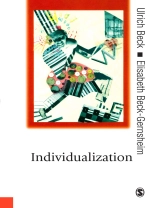Individualization argues that we are in the midst of a fundamental change in the nature of society and politics. This change hinges around two processes: globalization and individualization. The book demonstrates that individualization is a structural characteristic of highly differentiated societies, and does not imperil social cohesion, but actually makes it possible.
Ulrich Beck and Elisabeth Beck-Gernsheim argue that it is vital to distinguish between the neo-liberal idea of the free-market individual and the concept of individualization. The result is the most complete discussion of individualization currently available, showing how individualization relates to basic social rights and also paid employment; and concluding that in as much as basic rights are internalized and everyone wants to or must be economically active, the spiral of individualization destroys the given foundations of social co-existence.
Зміст
Losing the Traditional
Individualization and ′Precarious Freedoms′
A Life of One′s Own in a Runaway World
Individualization, Globalization and Politics
Beyond Status and Class?
The Ambivalent Social Structure
Poverty and Wealth in a ′Self-Driven Culture′
From `Living for Others′ to ′A Life of One′s Own′
Individualization and Women
On the Way to the Post-Familial Family
From a Community of Need to Elective Affinities
Division of Labour, Self-Imaging and Life Projects
New Conflicts in the Family
Declining Birthrates and the Wish to Have Children
Apparatuses Do Not Care for People
Health and Responsibility in the Age of Genetic Technology
Death of One′s Own, Life of One′s Own
Hopes from Transience
Freedom′s Children
Freedom′s Fathers
Zombie Categories
Interview with Ulrich Beck
Про автора
Ulrich Beck is Professor of Sociology at the University of Munich. He is the author of Counterpoison (1991) and Ecological Enlightenment (1992).












